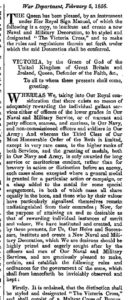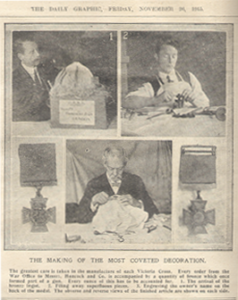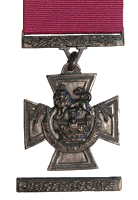As a part of the British Empire, Irish servicemen enlisted in the British Army. Service in the Imperial Forces entitled them to all the same awards and honors as English-born men. Among these awards the highest of them all is the Victoria Cross.
“World’s premier gallantry award”

The Victoria Cross was established during the Crimean War by Queen Victoria. On the announcement of this new award in 1856, the Queen is quoted as describing it as:
“a New Naval and Military Decoration, which We are desirous should be highly prized and eagerly sought after by the officers and men of Our Naval and Military Services” (1)
The company that makes the award, Hancocks of London, states that the “most conspicuous bravery, or some daring or pre-eminent act of valour or self-sacrifice, or extreme devotion to duty in the presence of the enemy” is needed for recognition of the award (2).
Russian Cannons?
According to legend, all Victoria Crosses are cast from two Russian cannons captured during the Crimean War, when the award was created.

While there are exceptions to this tale, with multiple guns from different sources being used, it nevertheless plays a large part of the lore around the prestigious award.
The Irish Connection:
The Irish have had a close connection with the V.C. since its inception. In fact, the first person to win the award in 1856 was Charles Davis Lucas, an Irishman.
Notable others include the first V.C. …
- for the Army
- in World War I
- for the Royal Air Force in World War II
- to an army chaplain
In addition, the youngest V.C. winners, Thomas Flynn and Andrew Fitzgibbon, both 15 years 3 months old, were Irishmen (3).
The Men:
Thirty-eight Irishmen were awarded the highest honor in the British Armed Forces during the Great War. They come from all backgrounds, such as Catholic and Protestant, Unionist and Nationalist, aristocratic ascendancy and poor farm laborers. The following six men highlight these differences, as do the memories and commemorations that followed their actions.
Michael O’Leary (1888 – 1961)
Edward Bingham (1881 – 1939)
Robert Quigg (1885 – 1955)
John Moyney (1895 – 1980)
James Duffy (1889 – 1969)
Martin Doyle (1891 – 1940)
(1). Lord Panmure, “War Department, February 5, 1856,” The London Gazette, February 5, 1856, accessed November 29, 2016, https://www.thegazette.co.uk/London/issue/21846/page/410.
(2). “The Victoria Cross,” Hancocks Comp., accessed December 4, 2016, http://www.hancocks-london.com/victoria-cross.
(3). Richard Doherty and David Truesdale, Irish Winners of the Victoria Cross (Dublin: Four Courts Press, 2000), 15.
Further Reading:
The V.C. and G.C. Association. “Our History.” Accessed November 28, 2016. http://www.vcgca.org/history

